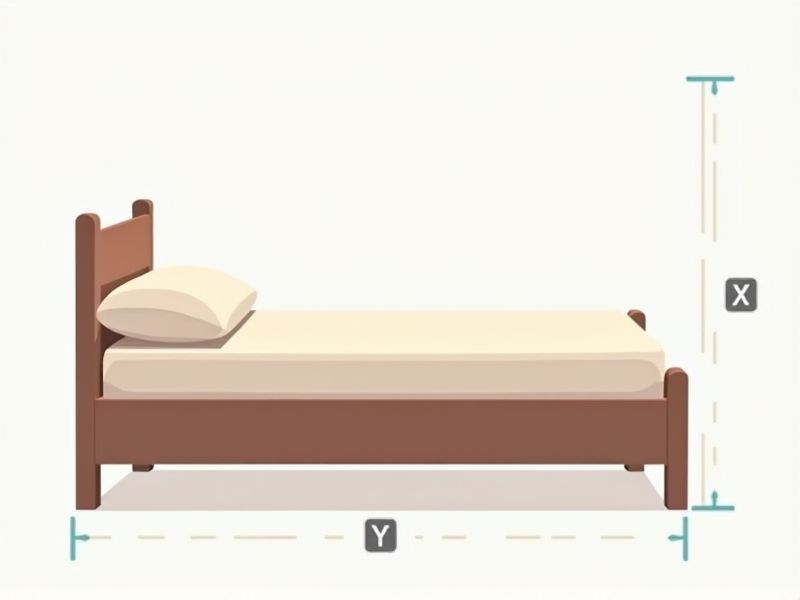
A standard king-sized bed typically measures 76 inches wide by 80 inches long, providing ample space for two people to sleep comfortably. This size is ideal for couples who want extra room or for individuals who enjoy more sleeping space. When considering bedding or bedroom furniture, keep these dimensions in mind to ensure everything fits well. Additionally, double-check entryways and staircases during delivery, as the king size can be challenging to move in tight spaces.
Bed Frame Size
A standard king-sized bed frame measures approximately 76 inches wide by 80 inches long, providing ample space for couples or individuals who prefer extra room while sleeping. The construction typically requires a sturdy material, such as hardwood or metal, to support the mattress and maintain structural integrity over time. When selecting a bed frame, consider the height; most standard models range from 14 to 18 inches in height, accommodating various mattress thicknesses and personal preferences. With customizable options available, you can easily find a style that complements your bedroom decor while maximizing comfort and support.
Mattress Dimensions
A standard king-sized bed measures 76 inches in width and 80 inches in length, providing ample space for couples or individuals who desire extra room to sleep comfortably. The mattress dimensions can significantly impact your sleep quality; a thicker mattress, usually between 10 to 14 inches, often offers better support and durability. When considering a king-sized mattress, look for materials that align with your sleep preferences, such as memory foam or innerspring options. Your choice should reflect not only comfort but also compatibility with the bed frame and any bedding accessories you may need.
Room Space Requirement
A standard king-sized bed measures 76 inches in width and 80 inches in length, requiring a minimum room space of approximately 10 feet by 12 feet for optimal comfort and movement. This setup allows for adequate space around the bed, enabling access to nightstands and other furniture. To ensure a functional layout, consider leaving at least 24 inches of walking space on either side of the bed. When arranging a king-sized bed, you'll maximize room utility while creating a restful environment.
Bedding Accessories Compatibility
A standard king-sized bed measures 76 inches wide by 80 inches long, requiring bedding accessories specifically designed for this size for optimal comfort. To ensure an accurate fit, look for fitted sheets that accommodate depths of up to 18 inches to cover your mattress properly. Consider adding pillows with dimensions of 20 x 36 inches for a cohesive aesthetic and support. Investing in quality bedding such as down comforters or mattress protectors tailored to king size can enhance your sleep experience significantly.
Mattress Thickness
A standard king-sized bed typically measures 76 inches wide and 80 inches long, providing ample space for couples or individuals who enjoy extra room. Mattress thickness for a king-sized bed generally ranges from 10 to 16 inches, with preference varying based on comfort needs and support levels. A thicker mattress often offers enhanced comfort through additional layers of foam or support technology, while a thinner option may provide a firmer surface. When selecting your mattress, consider that a thickness of at least 12 inches is often recommended for optimal support and durability.
Headboard Size
The standard king-sized bed typically measures 76 inches in width and 80 inches in length, offering ample space for you to stretch out comfortably. A headboard designed for a king bed usually ranges from 76 to 80 inches in width, ensuring it integrates seamlessly with your mattress setup. Height-wise, many headboards can vary from 36 to 54 inches, providing various aesthetic choices that complement your bedroom decor. When selecting a headboard, consider materials and styles; popular options include upholstered, wooden, and metal designs, catering to diverse tastes and room aesthetics.
Box Spring Dimensions
A king-sized bed typically measures 76 inches in width and 80 inches in length, but the box spring dimensions can vary slightly based on the design. A standard box spring for a king bed usually measures 76 inches by 80 inches, while some may include a split box spring design measuring 38 inches by 80 inches for easier handling. Ensuring that your box spring fits snugly beneath your mattress is crucial for optimal support, reducing wear and tear over time. When selecting a box spring, consider models that match your mattress type, such as memory foam or innerspring, to enhance comfort and stability.
Shipping And Moving Logistics
A standard king-sized bed measures 76 inches wide and 80 inches long, making it essential to consider dimensions during shipping and moving. When planning logistics, your bed may require special handling due to its bulk, with most shipping companies offering specific guidelines for oversized items. Secure packaging materials, such as mattress bags and sturdy boxes, can protect the bed from damage during transit. If you're utilizing a moving service, confirm that they have experience with king-sized beds to ensure a smooth delivery process.
Bed Program Compatibility
A standard king-sized bed measures 76 inches wide by 80 inches long, making it an ideal choice for couples who desire ample sleeping space. For optimal comfort, ensure your bed frame is compatible with standard king mattresses, including options such as adjustable bases. When selecting bedding, consider using a flat sheet measuring 108 inches by 102 inches and a fitted sheet specifically designed for king-sized dimensions. Your mattress choice is also crucial, with popular options including memory foam and hybrid models, which can enhance your overall sleeping experience.
Bedding Material Options
A standard king-sized bed typically measures 76 inches wide by 80 inches long, providing ample space for individuals or couples. When selecting bedding materials, options include cotton, known for its breathability and softness, and microfiber, which offers durability and stain resistance. Higher thread counts, often between 300 to 800, enhance the luxurious feel and longevity of the sheets. You should consider hypoallergenic materials such as bamboo or organic cotton if allergies are a concern, ensuring a comfortable and healthy sleeping environment.
